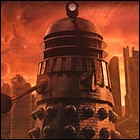 The Doctor finds himself unexpectedly saddled with a new companion, the aacerbic Lucie Miller, who’s not too happy to be with the Doctor, either. Unable to return her to her own time, the two mismatched companions find themselves on the planet Red Rocket Rising, where a natural catastrophe has pretty much destroyed the society. But hope seems to arrive in the form of friendly aliens called the Daleks, who ally themselves with Acting President Klint. The Doctor tries to stop the Daleks, but when they realize he is on Red Rocket Rising, they set a price for their cooperation: the Doctor.
The Doctor finds himself unexpectedly saddled with a new companion, the aacerbic Lucie Miller, who’s not too happy to be with the Doctor, either. Unable to return her to her own time, the two mismatched companions find themselves on the planet Red Rocket Rising, where a natural catastrophe has pretty much destroyed the society. But hope seems to arrive in the form of friendly aliens called the Daleks, who ally themselves with Acting President Klint. The Doctor tries to stop the Daleks, but when they realize he is on Red Rocket Rising, they set a price for their cooperation: the Doctor.
written by Steve Lyons
directed by Nicholas Briggs
music by ERSCast: Paul McGann (The Doctor), Sheridan Smith (Lucie Miller), Katarina Olsson (Headhunter), Anita Dobson (Eileen Klint), Hayley Atwell (Asha), Kenneth Cranham (Tom Cardwell), Nicholas Briggs (Daleks)
Notes: Producer/Director Nicholas Briggs has also voiced the Daleks in previous Big Finish productions, as well as the current BBC series.
Timeline: after The Girl Who Never Was and before Blood Of The Daleks Part 2
LogBook entry & review by Philip R. Frey
Review: Blood of the Daleks marks the return of original Doctor Who to the radio. While Big Finish has produced many audio stories over the last few years and in 2006 several Paul McGann audios were broadcast on BBC7, the last story to debut on air was 1994’s The Ghosts of N-Space. Unlike previous radio stories (and most Big Finish audios), this new series is being broadcast in a format more similar to the current TV series than the serials of old. While the opening and closing stories are two-parters, the rest are single, fifty-minute episodes.
 This story has a lot in common with older Dalek stories and specifically reminds me a lot of my favorite, Power Of The Daleks. It also bears striking similarities to the recent Cybermen stories from the TV series. I enjoyed seeing (okay, hearing) the Daleks back to their old, insinuating ways, pretending to help people in need in order to destroy them, rather than the all-out invasion-style stuff seen in most recent stories in all media.
This story has a lot in common with older Dalek stories and specifically reminds me a lot of my favorite, Power Of The Daleks. It also bears striking similarities to the recent Cybermen stories from the TV series. I enjoyed seeing (okay, hearing) the Daleks back to their old, insinuating ways, pretending to help people in need in order to destroy them, rather than the all-out invasion-style stuff seen in most recent stories in all media.
McGann is generally at ease in the role of the Doctor, which is to be expected given how much audio he’s done. The only place where he seems out of sorts is at the beginning, where his introduction to Lucie comes off a bit forced. Perhaps they are trying to alter the Doctor’s personality a bit to establish the shift in time from his other work (these are meant to take place well after the events in the other Big Finish stories). Unfortunately, it just serves to make his Doctor seem a bit “off”. Once the story gets underway, though, this problem falls away.
Sheridan Smith does all right with Lucie, but I can’t help but wonder if the Northern accent she uses is real or not. It seems so thick, I’d wager it’s a put on. Again, her worst stuff is early on, where they try to establish her character so quickly that she comes on too strong. It doesn’t help that they used her first scene to cram in a lot of establishing lines like “That is your hair?” (meant to establish that the Doctor hasn’t changed his hairstyle and to make a joke about McGann’s TV Movie wig) and “most of the controls are held on with duct tape” (meant to establish that the TARDIS is not in the best of shape, I suppose). I guess all this was supposed to allow the production team to hit the ground running, but a more traditional introduction (like Charlie Pollard received in Storm Warning) would have probably served better.
The rest of the cast does is fine, but no one really stands out. One thing that bugged me was the name of the Acting President. Now, there’s no reason to believe that the name “Klint” is in any way meant to be associated with former US President Clinton, but I couldn’t hear someone say “Acting President Klint” without thinking of him. Unless they wanted that to happen, they really should have thought of a different name.
I’ll hold off on a final judgement as far as Blood Of The Daleks is concerned until it concludes with the next episode, but for now it’s a pretty good start to the series. The fifty minute format works well, as the story doesn’t feel like it needed more for the part it was telling (again, subsequent episodes will make that judgement clearer). Format aside, in a lot of ways it’s much closer to the traditional Doctor Who than either TV run and has the potential to show what a McGann series would have been like even more than his previous audio work. Here’s hoping it lives up to that potential.
